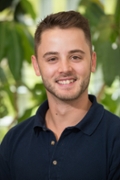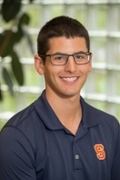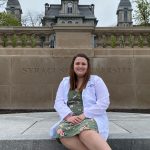Lab Director
Professor Communication Sciences and Disorders
1200 621 Skytop
315.443.7403
kvander@syr.edu
Lab Members
Emily completed a Bachelor of Science degree in communication sciences and disorders at The Pennsylvania State University in 2019.
esmith10@syr.edu
 Kaya Wechsler
Kaya Wechsler
AuD Student
Kaya completed Bachelor of Science degrees in communication sciences and disorders, psychology, and neuroscience at Syracuse University in 2019.
kawechsl@syr.edu
Lab Alumni

Christopher Edward Niemczak
AuD/PhD Graduate
Dr. Niemczak’s initial work in the Auditory Electrophysiology Lab focused on the cortical auditory representation of speech perception in background noise. Difficulty perceiving speech in background noise is the most common complaint in the audiology clinic. The goal of this work was to provide neurophysiological evidence that converged with behavioral findings. This work was focused on exploring the auditory cortical pathway to examine acoustic, linguistic, and cognitive factors that lead to difficulty perceiving speech in background noise. He created two paradigms to test energetic (speech-shaped noise) vs. informational masking (multi-talker babble) and bottom-up vs. top-down cortical processing of speech in background noise. Results from these studies indicated that informational masking affects the neural response more than energetic maskers. In addition, informational masking in the listeners native language alters the top-down, cognitive auditory processing as compared to foreign languages. This project successfully disentangled the critical cortical factors of informational masking to better understand why speech-on-speech masking is so detrimental to speech perception.
Dr. Niemczak’s current work that has developed from his work with the Space Medicine Innovations Lab at Dartmouth is the application of peripheral and central auditory tests in patients with HIV and other neurocognitive disorders. Even with modern antiretroviral therapy, HIV+ individuals may develop neurocognitive deficits due central nervous system involvement. The main results from both his cross-sectional and longitudinal analysis from a large study of HIV-positive individuals in Tanzania have shown that central auditory tests predict cognitive function. In addition, results showed that central auditory tests correlated to specific neurocognitive domains. These results have provided a new technique to monitor and track neurocognitive dysfunction in those with HIV. Specifically, this identified how central auditory tests can be used in developing countries as they are quicker, easier to understand, and do not require a trained administrator as compared to lengthy cognitive test batteries. This has led to the use of central auditory tests for potential surveillance and prediction of Zika, Alzheimer’s disease, and even COVID-19.

Kenneth Morse
AuD/PhD Graduate
Dr. Morse completed his Bachelor of Science in psychology at Lafayette College in 2014. He began his Ph.D. studies at Syracuse University working under the mentorship of Dr. Kathy Vander Werff. Together, they researched the pathophysiological mechanisms contributing to the perception of constant tinnitus (a ringing or other sound heard in the ears without the presence of any external stimulation). They objectively assessed tinnitus using auditory evoked potentials, which are non-invasively recorded electrical signals generated by the auditory system in response to sounds. The preliminary tinnitus research they conducted at Syracuse University established a foundation from which Dr. Morse will continue to build upon in his future studies to answer questions such as: What can auditory evoked potentials tell us about features of the auditory system in individuals who experience tinnitus versus those who do not experience tinnitus? Or, can auditory evoked potentials be a reliable and valid objective assessment of tinnitus in humans? These are the research questions Dr. Morse is exploring as a professor in the Communication Science and Disorders department at West Virginia University.


